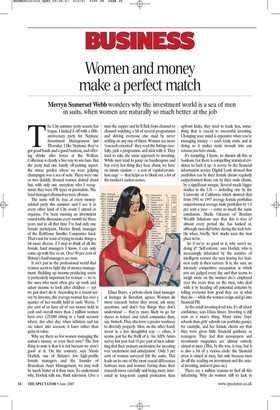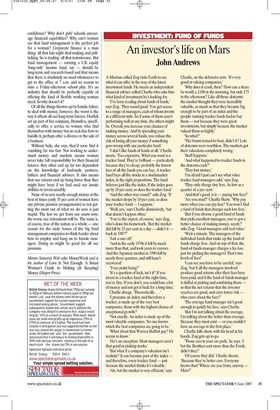Women and money make a perfect match Merryn Somers
Women and money make a perfect match Merryn Somerset Webb wonders why the investment world is a sea of men in suits, when women are naturally so much better at the job The City summer party season has begun. I kicked it off with a fifthanniversary party for Neptune Investment Management last Thursday. I like Neptune: they've got good funds and a good business, and offering drinks after hours at the Wallace Collection is clearly a fine way to win fans. But the party had one faintly off-putting aspect: the statue garden where we were gulping champagne was a sea of suits. There were one or two daintily dressed women dotted about but, with only one exception who I recognised, they were PR types or journalists. The fund managers themselves were all men.
The same will be true at every moneyrelated party this summer and I see it in every other kind of City event I attend or organise. I've been running an investment round-table discussion every month for three years and in all that time I've had only one female participant, Marina Bond, manager of the Rathbone Smaller Companies fund. That's not for want of trying to make things a bit more diverse: if I stop to think of all the female fund managers I know, I can only come up with five or six. Over 90 per cent of Britain's fund managers are men.
It isn't just in the professional world that women seem to fight shy of money management. Building up income-producing assets is particularly important for women — we're the ones who most often give up work and salary income to look after children — yet we just don't do it. According to a recent survey by Investec, the average woman has over a quarter of her wealth held in cash. Worse, 7 per cent of us have all of our money held in cash and overall more than 2 million women have over £25,000 sitting in a bank account where, day after day, when inflation and tax are taken into account, it loses rather than gains in value.
Why are there so few women managing the nation's money, or even their own? The first thing to note is that it is not because we aren't good at it. On the contrary, says Nicola Horlick, one of Britain's few high-profile female managers and the founder of Bramdean Asset Management, we may well be much better at it than men. To understand why, Horlick tells me, think television. Give a man the zapper and he'll flick from channel to channel watching a bit of several programmes and driving everyone else mad by never settling on any one of them. Women are more 'research-oriented': they read the listings carefully, pick a programme and stick with it. They tend to take the same approach to investing. While men tend to jump on bandwagons and buy every hot thing they hear about, we have an innate caution — a sort of 'capital-protection urge' — that helps us to block out a lot of the market's useless noises.
Elissa Bayer, a private-client fund manager at Insinger de Beaufort, agrees. Women do more research before they invest, ask more questions, and don't buy things they don't understand — they're more likely to go for shares in leisure and retail companies than, say, biotech. They also have a greater tendency to diversify properly. Men, on the other hand, invest in a less thoughtful way — often, it seems, just for the thrill of it. An ABN Amro survey last year had 18 per cent of men admitting that their primary motivation for investing was 'excitement and anticipation'. Only 5 per cent of women surveyed felt the same. This leads on to one of the most crucial differences between men and women: having done their research more carefully and being more interested in long-term capital protection than upfront kicks, they tend to trade less, something that is crucial to successful investing. Changing your mind is expensive when you're managing money — each trade costs, and in doing so it makes nasty inroads into any returns you have made.
It's tempting, I know, to dismiss all this as bunkum, but there is compelling statistical evidence to back it up. A survey by the financial information service Digital Look showed that portfolios run by their female clients regularly outperformed those run by their male clients, by a significant margin. Several much bigger studies in the US — including one by the University of California which showed that from 1991 to 1997 average female portfolios outperformed average male portfolios by 1.4 per cent a year — come to much the same conclusion. Sheila Gleason of Barclays Wealth Solutions says that this is true of almost every period she has looked at, although men did better during the tech bubble when, briefly, 'hot' stocks were the best place to be.
So if we're so good at it, why aren't we doing it? 'Self-esteem,' says Horlick, who is increasingly infuriated by the number of intelligent women she sees leaving her business early in their careers. It is, she says, an intensely competitive occupation in which you are judged every day and that seems to weigh more on the women she's employed over the years than on the men, who deal with it by heading off potential criticism by telling everyone how good they are at what they do — while the women resign and go into financial PR.
At the retail investing level too, it's all about confidence, says Elissa Bayer. Investing is still seen as a man's thing. Many more boys' schools than girls' schools run portfolio games, for example, and her female clients say that they were given little financial guidance as teenagers. They feel that newspapers and investment magazines are almost entirely aimed at men. (This, by the way, is true, but it is also a bit of a vicious circle: the financial press is aimed at men, but only because men do all the reading on investment and the actual investing, and so it goes on.) There are a million reasons to find all this infuriating. Why do women still so lack in confidence? Why don't girls' schools encourage financial capabilities? Why can't women see that fund management is the perfect job for a woman? Corporate finance is a man thing: all that late-night deal-making and politicking. So is trading: all that testosterone. But fund management — running a UK equity long-only' income fund, say — should be long-term and research-based and that means that there is absolutely no need whatsoever to get to the office at 7 a.m. and no reason to miss a Friday-afternoon school play. It's an industry that should be perfectly capable of offering the kind of flexible working women need. So why doesn't it?
Of all the things thrown up by female failure to deal with money, however, the worst is the way it affects all our long-term futures. Horlick set up part of her company, Bramdiva, specifically to offer a service to women who find themselves with money but no real clue how to handle it, perhaps after a divorce or the sale of a business.
Without help, she says, they'd soon find it vanishing far too fast. Not working to understand money and markets means women never take full responsibility for their financial futures: they often end up far too dependent on the knowledge of husbands, partners, fathers and financial advisers. It also means that our returns end up being lower than they might have been if we had used our innate abilities to invest sensibly.
None of us save nearly enough money at the best of times (only 35 per cent of women have any private pension arrangements) so not getting the most out of what we do save is just stupid. The less we get from our assets now, the worse our retirements will be. The same is, of course, true of the nation as a whole — one reason for the male bosses of the big fund management companies to think harder about how to employ and hang on to female managers. Doing so might be good for all our pensions.
Menyn Somerset Web edits MoneyWeek and is the author of Love Is Not Enough: A Smart Woman's Guide to Making (& Keeping) Money (Harper Press).





























































 Previous page
Previous page